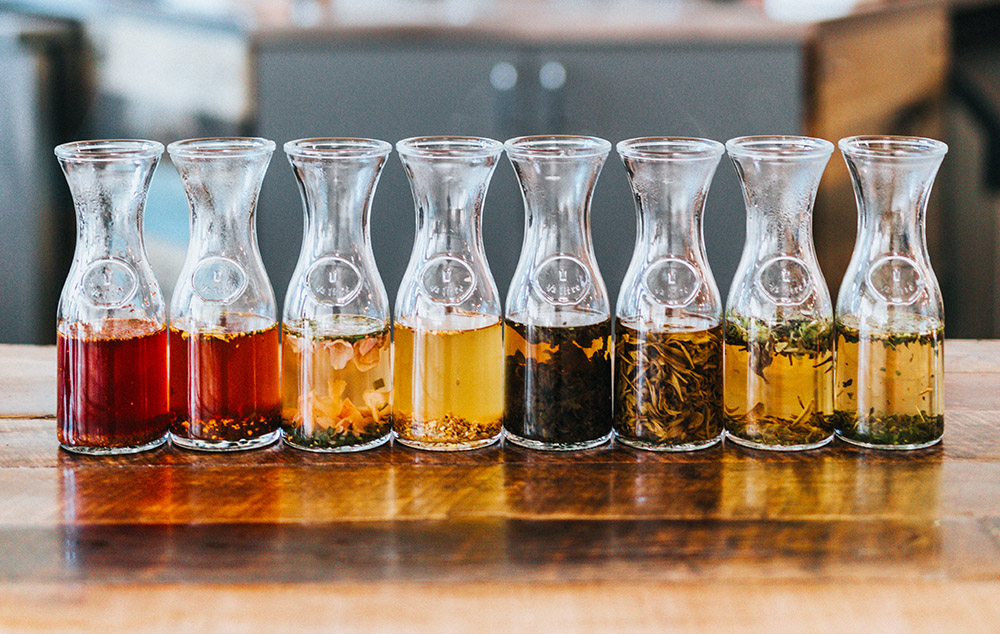Kombucha, a fermented tea, known for its health benefits, is coming on stronger than ever. Our behavior science partner, CultureWaves, has been watching this trend grow over the past several years.
Guest columnist Drew Williams, co-founder of BOOCHFEST, the International Kombucha Featival in Canada, explains the intrigue and benefits of this fermented neutraceutical. You can also find 8 evidence-based health benefits of Kombucha on Healthline.
As an added bonus, Drew is sharing 6 cocktail and mocktail recipes featuring Kombucha here. —Editor
It’s Not Just For Yogis Any More
Once thought of as a healthy tonic only for those who practice meditation and yoga, kombucha has gone mainstream. Kombucha is showing up in large grocery chains, at Starbucks and in a growing number of restaurants and eateries. This effervescent drink is taking on big soda companies by storm.
Kombucha contains vitamins and minerals essential to our functioning body. It also contains probiotics which help with digestion and improve overall gut health.

Classified as a functional beverage, kombucha is a drink with benefits! Functional beverages are beverages that provide added benefit to the person drinking it. Growing in popularity over the last few years, energy drinks, ready-to-drink coffee, bottled tea, sports drinks, and coconut water have been squeezed into smaller and smaller retail space to make room for kombucha. Kombucha has 39.4 percent of the functional beverage space in the United States and will continue to grow according to many reports.
A Gathering Around Kombucha
Kombucha Brewers International, the voice for the global kombucha industry, has more than 270 members, most of which are commercial kombucha brewers. These kombucha companies range in size from brewers in process who are selling their drink at farmers’ markets to the market leader—GT’s Living Foods—who sales figures hit the $100M mark last year. The diversity of kombucha is exploding and worth searching for. Experimenting, trying and tasting is the only answer to finding the kombucha that will make your gut smile.
What makes these brands different? A great deal. The basic ingredients for kombucha are water, tea, sugar and SCOBY. One might assume that all kombucha would taste the same since they all have the same ingredients, right? Well, the answer is no. It’s very difficult to find two kombucha brands that taste the same. They might taste similar, but not identical.
One of the reasons for this is the diversity of teas that can be used in kombucha production. The world of tea is incredibly diverse, with more than 1,500 different varieties worldwide. Each of these teas has its own origin, preparation, bitterness, sweetness, acidity, flavor profile, and brewing time.

It’s All In The Brewing
Another reason for the different flavor profiles of kombucha brands is the preparation and process. Brewing tea for a certain amount of time will bring out desired characteristics in the final kombucha product. The amount and type of sugar that is added to the brew affects the sweetness and sourness of kombucha. Even temperature and time play a role in kombucha making. Ferment kombucha for a longer period of time and the SCOBY has a chance to eat up more sugar resulting in a more tangy flavor profile. Fermenting kombucha in a warmer environment will speed up the fermentation process.
With all these variables in play, the consumer is the ultimate beneficiary. There is a kombucha made just for you, it’s just a matter of finding it.
Enjoying kombucha can happen in many ways. On a hot day, drinking kombucha right out of the fridge will quench your thirst. Bringing it to a picnic in the park or to a dinner party will add a healthy alternative to sugary drinks typically consumed at these events. Another way of enjoying kombucha is mixing it (with or without alcohol)! Because kombucha is available in so many different flavors, it makes finding a substitute for a sugary drink easy.
You’ll find some delicious cocktail and mocktail recipes, featuring kombucha, shared by Drew here.
About Drew Williams
Drew Williams is the co-founder of BOOCHFEST, creator of the International Kombucha Festival, as well as many other kombucha events and competitions.


